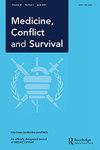佩加斯-麦吉尔课程:人类世当前健康威胁的教育模式。
Q3 Medicine
Medicine, Conflict and Survival
Pub Date : 2023-09-01
Epub Date: 2023-05-18
DOI:10.1080/13623699.2023.2211698
引用次数: 0
摘要
本文章由计算机程序翻译,如有差异,请以英文原文为准。
PEGASUS McGill courses: a model for educating on current threats to health in the Anthropocene.
As today’s world becomes more clearly interconnected, critical areas of intersection affecting global health include migration, conflict, and the environment. To help inform global citizens, academics, public health practitioners, policymakers, health professionals and students to approach these issues as we seek collective action, the PEGASUS Institute has partnered with McGill University to offer a summer series in a Summer Institute to design an educational programme on the current threats to health in the Anthropocene, the geological epoch defined by human activity’s significant impact on the planet. These courses explore the impact of issues such as climate change, resource depletion, and conflict on the health of populations and individuals and emphasize the interconnectedness of such issues, as for example how environmental degradation can exacerbate migration promoting conflict, each of which have negative consequences for health, but also can in turn promote migration and environmental degradation. Further, they seek to help develop frameworks for solutions, incorporating concepts of equity and global justice. McGill University’s Summer Institutes in Global Health began in 2015 with courses focused on research and infectious disease, and now have expanded to over 50 global health courses with 5000 participants. In 2021 as the new non-profit began, Board member Charles Larson, Director of the McGill Global Health Programs, suggested we develop courses related to our themes 25 as a form of outreach and minimal revenue generation. PEGASUS Institute, a new Canadian educational non-profit founded at the end of 2020 has recently become a charity. From 2014 it developed out of biennial conferences examining global health (with underserved populations locally and internationally) at its nexus with Peace and Sustainability; when the pandemic meant the cancellation of the April 2020 conferences, we were forced to pivot to webinar sessions focused on equity, networking and refugee health professionals. Bringing together practitioners, researchers,
求助全文
通过发布文献求助,成功后即可免费获取论文全文。
去求助
来源期刊

Medicine, Conflict and Survival
Medicine-Pathology and Forensic Medicine
CiteScore
1.80
自引率
0.00%
发文量
46
期刊介绍:
Medicine, Conflict and Survival is an international journal for all those interested in health aspects of violence and human rights. It covers: •The causes and consequences of war and group violence. •The health and environmental effects of war and preparations for war, especially from nuclear, radiological, chemical and biological weapons of mass destruction. •The influence of war and preparations for war on health and welfare services and the distribution of global resources . •The abuse of human rights, its occurrence, causes and consequences. •The ethical responsibility of health professionals in relation to war, social violence and human rights abuses. •Non-violent methods of conflict resolution.
 求助内容:
求助内容: 应助结果提醒方式:
应助结果提醒方式:


